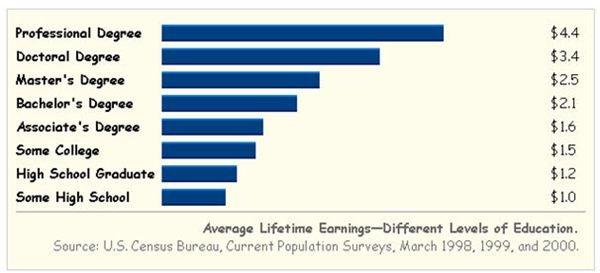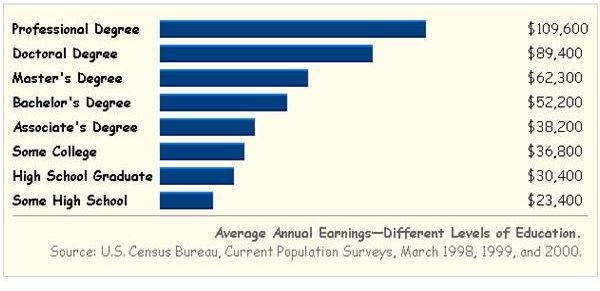Difference Between a Bachelor's and An Associate's Degree: An Associate's Degree is the First Undergraduate College Degree You May Earn
Introduction
It is important for you to understand the difference between a bachelor’s and an associate’s degree program, so you can make the best decision for your education and your future career. Associate’s and bachelor’s degrees are both undergraduate degrees, but an associate’s degree is often the first choice for students who either have not made a decision about a specific career or have not determined if they would pursue college beyond an associate’s degree. Conversely, some students select an associate’s degree in a specific concentration because they know that is all they need for the career path of their choice.
For those students who desire more education beyond an associate’s degree, many of those credits can transfer into bachelor’s degree programs, depending on the area of study. Other students choose to bypass associate’s degrees and enroll in bachelor’s degree programs as their first options. The choice is up to you, based on your education and career goals.
Associate’s Degree Specifics
Generally, a traditional associate’s degree requires 60 credit hours, which represents a time commitment of two years to complete (compared to an online program, which usually takes less than two years). Community, junior, and technical colleges, as well as many four-year colleges and universities, offer a variety of associate’s degree programs. Most people with professional or vocational associate’s degrees qualify for entry-level positions, while students who earn Associate of Arts or Associate of Science degrees may choose to transfer their credits into bachelor’s degree programs. [1]
Associate’s degree programs vary in cost, depending on the area of study. Generally, however, the average tuition cost was about $8,116 for tuition, room, and board, according to the 2008-2009 data provided by the National Center for Education Statistics (NCES). [ 2] A variety of associate’s degree programs are available at numerous colleges covering a wide range of fields, including the following (list provided at EarnMyDegree.com site) [3]:
- Art
- Business
- Culinary Arts
- Education and Teaching
- Graphic Design
- Healthcare
- Human Services
- Legal/Paralegal
- Math
- Political Science
- Psychology
- Religious Studies
- Science
- Technology
Bachelor’s Degree Specifics
Typically, a traditional bachelor’s degree takes four years to complete (compared to an online program, which can reduce your time to between two to three years, depending on various factors), with required credit hours between 96 to 128 depending on the field of study and number of electives chosen. If you earn an associate degree first, most of your credits should transfer into your bachelor’s degree program, which can usually reduce your completion time to two years.
Some colleges that award both associate and bachelor degrees offer a “2 + 2” program, or have articulation agreements with other colleges, that allow you to seamlessly transfer all your associate degree credits into your bachelor degree program — two years for each degree level. This would allow you to spend four years instead of six, earning your two degrees.
If you enter a bachelor’s degree program as your first college experience, then you can plan to take primarily foundational and general education courses for the first two years. The remaining two years of your four-year program will include specific courses and electives relevant to your chosen major.
The fields of study for bachelor’s degree programs include the same mentioned in the previous section for associate’s degree programs; however, you usually have an even broader selection of concentrations within each specific area. A bachelor’s degree is often the minimal degree required by a majority of occupations. Like associate’s degree programs, bachelor’s degree programs also vary in cost, depending on the area of study and the institution itself. Again, according to the 2008-2009 data provided by the NCES, the average cost was about $20,154 for tuition, room, and board. [4]
Career Outlook
Career options vary greatly depending on the subject area of an associate’s or bachelor’s degree program. Certain fields, such as healthcare, education, technology, and other professional areas, are among the fastest growing, “in demand” careers, according to the Bureau of Labor Statistics. [5]
Earning power also varies for the same reasons; however, the level of education has a direct impact on increasing potential wages and lifetime earnings. At EarnMyDegree.com, statistics demonstrate that every additional degree adds to your overall earning power. For example, on average, people with associate degrees may expect to earn around $38,000 annually, while wages increase to about $52,000 for those with bachelor degrees. [6]
The graphic charts below, used by permission, highlight the differences; be aware these figures reflect 2000 data from the U.S. Census Bureau and do not account for changes over the past 10 years in the economy or employment statistics (click for a larger view). [7]
Average Annual Earnings for College Graduates and Non-Graduates
Work-Life Earnings for Full-Time Employees (in $ millions)

[Images Source: EarnMyDegree.com, https://www.earnmydegree.com/online-education/learning-center/education-value.html]
Conclusion
Once you understand the difference between a bachelor’s and an associate’s degree, you can make a more informed decision about which degree program is more appropriate for your education and career goals. While the associate’s degree requires two years or less to complete, the traditional bachelor’s degree takes twice as long—usually four years. You may find an associate’s degree program of interest at a local community or junior college, but you need to seek a bachelor’s degree program at a four-year college or university. Of course, the cost is higher for a bachelor’s degree program, but you can make up for the initial investment in better career opportunities and higher earning power. Choose the degree program that is most relevant for your personal career aspirations.
Citations
[1] [3] EarnMyDegree.com. Associate Degree Programs. Retrieved from https://www.earnmydegree.com/online-education/associate/
[2] [4] National Center for Educational Statistics. Average undergraduate costs of education. Retrieved from https://nces.ed.gov/programs/digest/d09/tables/dt09_334.asp
[5] Bureau of Labor Statistics. Employment Projections: 2008 – 2018. Retrieved from https://www.bls.gov/news.release/ecopro.nr0.htm
[6] [7] EarnMyDegree.com. Job Salary Earnings Comparison. Retrieved from https://www.earnmydegree.com/online-education/learning-center/education-value.html
Images Permission
The earnings charts are included, thanks to permission granted by J. Faust of the Communications Strategy Group in affiliation with EarnMyDegree.com.
